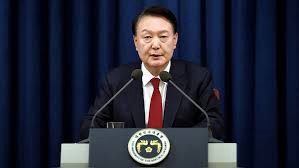Lagatar24 Desk
Seoul: South Korean investigators faced a tense standoff on Friday as they attempted to arrest impeached President Yoon Suk Yeol at his residence over allegations of a failed martial law bid. Yoon, who was suspended from office by lawmakers, would be the first sitting president in South Korea’s history to face arrest if the warrant is executed.
The Corruption Investigation Office (CIO) initiated the warrant execution, with senior prosecutor Lee Dae-hwan and a team of officials entering the heavily guarded presidential residence. However, they encountered resistance from military units and the Presidential Security Service, who have reportedly blocked previous attempts by law enforcement.
Legal and Security Tensions
Yoon’s legal team condemned the arrest attempt, calling the warrant “illegal and invalid.” His lawyer, Yoon Kap-keun, vowed to challenge the move in court. Meanwhile, thousands of police personnel and security barricades were deployed around the residence to prevent clashes between Yoon’s supporters and detractors.
The warrant stems from Yoon’s controversial December 3 declaration of martial law, which briefly threatened South Korea’s democratic fabric. If convicted, Yoon could face life imprisonment or even the death penalty.
Public Reaction and Political Ramifications
Protests erupted outside Yoon’s residence, with far-right supporters and evangelical groups holding all-night prayer sessions in solidarity. Opposition to Yoon’s arrest has been intense, with clashes reported during earlier court proceedings.
Yoon has been holed up inside the residence since a court approved the warrant earlier this week, pledging to resist authorities’ efforts to detain him.
Broader Implications
The case has drawn widespread attention, raising concerns over the stability of South Korea’s political landscape. The CIO, supported by police, intends to detain Yoon for questioning at their Gwacheon office. If detained, Yoon can be held for 48 hours before investigators seek an extension.







